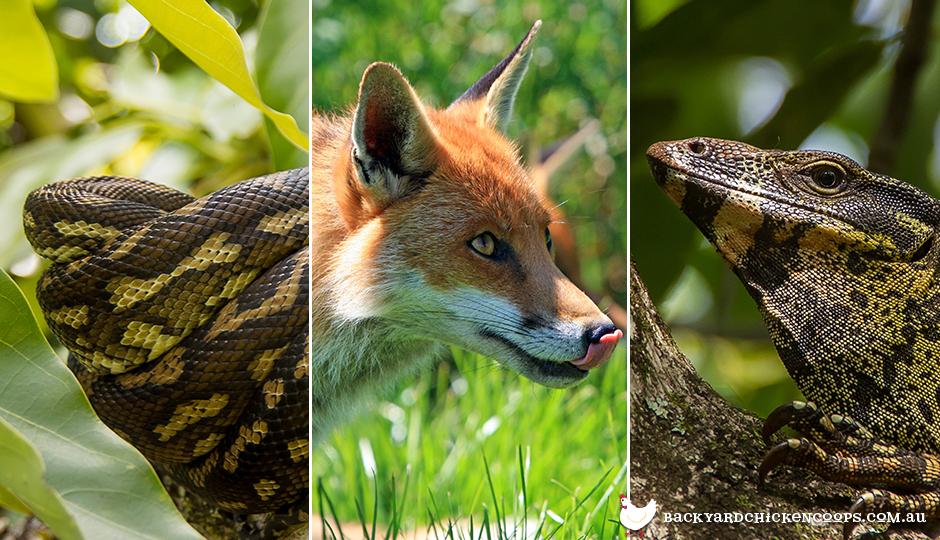Looking to find ways on how to protect your chickens from predators is not an easy task, especially if you are free-ranging and living near the woods where all sorts of wild predators roam around.
If you keep a chicken coop or plan to do so, then one thing you always have to think about is the safety of the chicken coop and the best way to protect yourself from predators. If you don’t pay attention to this topic, unfortunately, you can have a horrible discovery in the morning when you feed the flock.
It seems that almost all wild creatures, and many domestic ones, can appreciate a delicious chicken dinner. So how do you protect your flock so you don’t have to worry about losing your bird broth to raccoons, dogs, weasels, hawks, and more?

Potential Poultry Predators
If they are newborn chickens, they may not even know what predators are. Or you may think that if you live in the suburbs or within city limits, you don’t have to worry about predators. But pets can also be chicken killers.
So which animals should you protect your chickens against? Here are the most common chicken predators:
- neighborhood dogs
- weasels / stoats / wines
- foxes
- raccoons
- coyotes
- wild and domestic cats
- owls and hawks
- snakes (chicks)
- rats (chicks)
Some predators, such as snakes and rats, are only likely to eat half-grown chicks or chicks, not fully grown birds. Others, like skunks, will only eat chicken eggs and leave the chickens alone.
So how to protect your chickens from predators? Follow these steps.
Coop Security
There are some simple steps you can take to protect your precious chickens from predation. The first step is to have a secure chicken coop with a door that closes securely at night. Other tips include:
- Dig a 12-inch deep trench around the entire chicken coop and bury the hardware store there. Hardware store fabric is a small, sturdy product that is sold in rolls at your local hardware store. It is similar to the chicken wire but more resistant. This will prevent predators from digging.
- Raise the chicken coop off the ground to help prevent mice, rats, and weasels from entering the coop.
- Inspect the bottom of the chicken coop and patch holes where predators can enter.
- Put lights around the chicken coop at night; motion sensor lights work fine.
- Keep your compost pile away from the chicken coop. Don’t let food scraps stick around. Clean up any food the chickens aren’t eating before dark.
- Cut the grass or field near or around the chicken coop. An open field without cover is a deterrent to predators.
- If you have a serious problem with hawks and owls, consider covering the chicken coop with a hawk net.
Choose the best predator repeller lights
Electric Fencing
Electric fences can be a good option for securing poultry. There are several ways to install it. The first method is to have a static chicken coop and run an electrical wire around the bottom of the coop in such a way that even digging predators cannot get in.
Another option is to use a mains fence to protect your chickens. Predators stop, down to the ground, and the management system of moving your chickens to fresh pastures appears to be an additional effective deterrent.
Bird Protectors
There are other ways to protect poultry and some of them will work for any animal on the farm. Dogs are great protectors of the small farm or estate and will keep everything from sheep to cattle to chicks safe from roaming predators, including other dogs.
However, there is a problem with dogs. Some dogs, playful creatures that they are, love to chase and tease chickens. They can often kill chickens inadvertently or unintentionally. To avoid a canine catastrophe, if you have a livestock guardian puppy, be sure to monitor their interactions with chickens when they are young, and correct them each time they chase your feathered farm animals.
If you don’t feel like having a dog, guinea pigs are also great guardians of the herd. They chase everything from the postman to the coyotes. But beware, your protection comes at a high price. Guineas are not quiet animals, and they cannot be trained to be quiet like (some) dogs. Still, guinea pigs have an added benefit: these birds will eat all the insects you can imagine that could plague your yard and yard, from ticks to flies.
Weapons and Traps
The last layer of protection against predators is a weapon. Without going into the gun possession policy, shooting the offending animal or firing a shotgun in the direction of the offending predator will certainly scare or eliminate the problem.
For example, a weasel was shot and killed after eating the faces of several chickens in the chicken coop. If the weasel was not dispatched, it is very likely that he has returned night after night to feast on well-fed chickens.
Guns can serve a purpose around the house and on the farm. Just make sure you have taken safety equally seriously and are obeying all laws.
Traps can serve as a good potential offense against predators, but be sure to research the safest type for the animal you need to catch and use them judiciously only when all other measures have failed.
See Also: